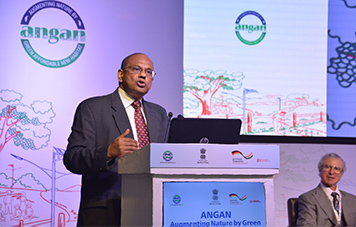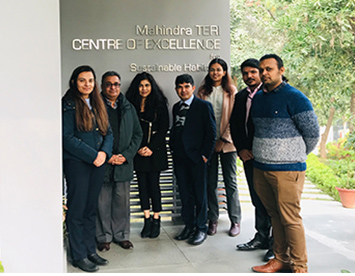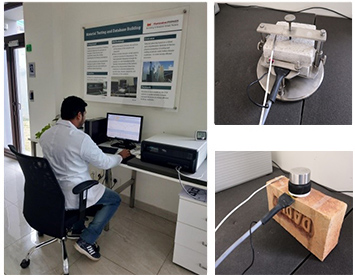 |
|
|
|
INTRODUCTION TO GREEN BUILDING PROFESSION: SKILL TRAINING & MANAGEMENT PROGRAMME
|
Current times have presented before us challenges we might not have anticipated. Regulated assembly of people at one place have also affected the way we did impart and gain knowledge every day. This calls for an update in the mode of learning.
Sustainable Habitat Programme, TERI, has launched the “Introduction to Green Building Profession: Skill Training & Management” programme. We envisage it to be the first step to becoming a green building professional, for final year students, fresh graduates and young professionals seeking to understand the green building industry better.


- The K ECBC 2014 had been updated as KECBC 2018 and notified in the Karnataka State Gazette on 28th May 2020. The Code is mandatory and the enforcement of the Code came into effect in the State from the date of notification for efficient use of energy in the Commercial Buildings.
- 'Introduction to Green Building Profession: Skill Training & Management' programme launched.
- 'Web-S: Unlocking Sustainability 2020' a series of six webinars on mainstreaming resource efficiency in the built environment launched
1.KPMG (2020). Covid-19: assessment of economic impact on construction sector in India
International Conference ‘ANGAN’ on Building Energy Efficiency organised in New Delhi - 9th - 11th September 2019
TERI played the role of being the Knowledge Partner for organizing ANGAN (Augmenting Nature by Green Affordable New-habitat), a 3-day International Conference on behalf of the Bureau of Energy Efficiency (BEE) of the Government of India and Deutsche Gesellschaftfür Internationale


The success of the event could be gauged from the fact that it brought stakeholders from more than eleven nationalities on a common platform to address critical issues in the domain of building energy efficiency.
|
|
|
KNOWLEDGE EXCHANGE PROGRAMME
|
The University of New South Wales (UNSW), Sydney, Australia suggested on ushering of a new partnership between TERI, GRIHA Council, Deutsche Gesellschaft für Internationale Zusammenarbeit (GIZ), and UNSW. In this regard, TERI organized a
‘Knowledge Exchange Programme cum Field Visit on built environment framework through implementation pathway of Australia – strategies for EcoNiwas Samhita’ from August 11–17, 2019 in Charles Darwin University, Darwin and UNSW, Sydney for a delegation from India comprising of Central/State government officials. and UNSW. In this regard, TERI organized a
‘Knowledge Exchange Programme cum Field Visit on built environment framework through implementation pathway of Australia – strategies for EcoNiwas Samhita’ from August 11–17, 2019 in Charles Darwin University, Darwin and UNSW, Sydney for a delegation from India comprising of Central/State government officials.
 TERI and UNSW signed a MoU on August 15, 2019 identifying broad areas of mutual interest for collaboration through applied research.
TERI and UNSW signed a MoU on August 15, 2019 identifying broad areas of mutual interest for collaboration through applied research.
|
|
IMPACT OF COVID 19 PANDEMIC ON CONSTRUCTION SECTOR1
|
 |
13 to 30% reduction in Investments |
 |
15 to 34% reduction in Gross Value Added |
 |
11 to 25% reduction in employment |
 |
20 to 25% rise in labour costs for skilled workers.
10-15% rise in labour costs for semi and unskilled workers.
|
COVID-19: A strategic opportunity for sustainable development
 -Mr Siddharth Jain
-Mr Siddharth Jain
The sector-specific allocations for health, education, and infrastructure the Union Budget 2020-21 collectively make up only a fraction of India's GDP. Our rapidly developing economy is threatened in the wake of a new global pandemic, COVID-19.

 COVID-19 and Water Industry: Challenges and opportunities in the new normal
COVID-19 and Water Industry: Challenges and opportunities in the new normal
-Dr. Nupur Bahadur
The published article is an invited contribution in the 20th Anniversary Special Issue of Everything About Water magazine, June 2020. It focuses on various challenges present before the Water Industry during COVID-19 pandemic and how with every challenge lies an opportunity in the new normal.

|
|
|
|
|
WEB-S: UNLOCKING SUSTAINABILITY 2020 WEBINAR SERIES
|
|
The onset of COVID-19 pandemic, a public health emergency of international concern, has presented a situation of social and economic turmoil. Limiting the economic impact of the pandemic and stimulating the economies, once the pandemic is brought under control and operations resume to a ‘new normal’, is a vital concern of the government.
In view of the above, Sustainable Buildings Division, TERI, launched 'Web-S: Unlocking Sustainability 2020' a series of six webinars, each with a progressive focus on various aspects related to mainstreaming resource efficiency in the built environment. The series focuses on building the capacity and knowledge of building practitioners, practitioners in ULBs, early career researchers, and university students towards informed decision-making for resource efficiency. First three in the series are as follow:
|
|
|
|
|
STRATEGIC PARTNERSHIPS AND COLLABORATION
|
Visit by Scientia Professor Veena Sahajwalla, Director, Sm@rt Centre, UNSW, Sydney, Australia to MTCoE Lab
Scientia Professor Veena Sahajwalla and her colleagues visited the Mahindra TERI Centre of Excellence on 20th December, 2019 to understand the on-going testing and research work that the lab is currently undertaking. Mr. Sanjay Seth, Senior Director, Sustainable Habitat Program provided a walk-through tour of the CoE and his colleagues demonstrated the testing of thermal properties in the lab using TPS500S and Guarded Hot Box equipment.

|
|
|
|
TESTING INFRASTRUCTURE FOR THERMAL PROPERTIES OF BUILDING MATERIALS
|
Hot Disk TPS 500 Thermal Constants Analyser
The thermal properties of building materials affects occupant comfort, energy consumption and carssbon footprint. While thermal testing is a common practice, knowledge gaps do exist in the market. We at Mahindra TERI CoE (NABL accredited lab) are currently testing the thermal conductivity, thermal diffusivity and specific heat capacity of homogenous and opaque building materials using the latest Transient Plane Source technology of the Hot Disk TPS 500 to investigate and create a database of the thermal properties of conventional and emerging construction materials.


|
|
|
STUDY ON SUSTAINABLE SPACE HEATING SOLUTIONS
|
The Indian Himalayas are one of the most ecologically fragile regions in the world. Given its cold climatic conditions and unavailability of regular source of power and limited financial capacity of local communities, people in the Indian Himalayan Region (IHR) often resort to fuel wood to provide thermal comfort in their built environment. The traditional space heating mechanisms not only contribute to the increasing emissions in the region but also lead to degradation of natural resources and adversely impact the health of people residing in these areas.
With this objective, WWF India (World Wide Fund for Nature) and The Energy and Resources Institute (TERI) collaborated in a study and released the report, “Sustainable Space Heating Solutions in the Himalayan Region”, which studies the impact of the adoption of newer and cleaner energy technologies on emissions in the IHR and suggests that sustainable space heating systems can bring down CO2 emissions.
 |
Click here to download a copy of the Report.
 |
|
|
|
 |
|
Sustainable Building (Delhi), TERI
Core 6C, Darbari Seth Block
India Habitat Centre, Lodhi Road
New Delhi – 110003
Email: sbmail@teri.res.in
Fax: 011-24339609
Tel: 011-24339606, 011-46444500
|
 |
|
|
|




 and UNSW. In this regard, TERI organized a
‘Knowledge Exchange Programme cum Field Visit on built environment framework through implementation pathway of Australia – strategies for EcoNiwas Samhita’ from August 11–17, 2019 in Charles Darwin University, Darwin and UNSW, Sydney for a delegation from India comprising of Central/State government officials.
and UNSW. In this regard, TERI organized a
‘Knowledge Exchange Programme cum Field Visit on built environment framework through implementation pathway of Australia – strategies for EcoNiwas Samhita’ from August 11–17, 2019 in Charles Darwin University, Darwin and UNSW, Sydney for a delegation from India comprising of Central/State government officials.
 TERI and UNSW signed a MoU on August 15, 2019 identifying broad areas of mutual interest for collaboration through applied research.
TERI and UNSW signed a MoU on August 15, 2019 identifying broad areas of mutual interest for collaboration through applied research.

 COVID-19 and Water Industry: Challenges and opportunities in the new normal
COVID-19 and Water Industry: Challenges and opportunities in the new normal










